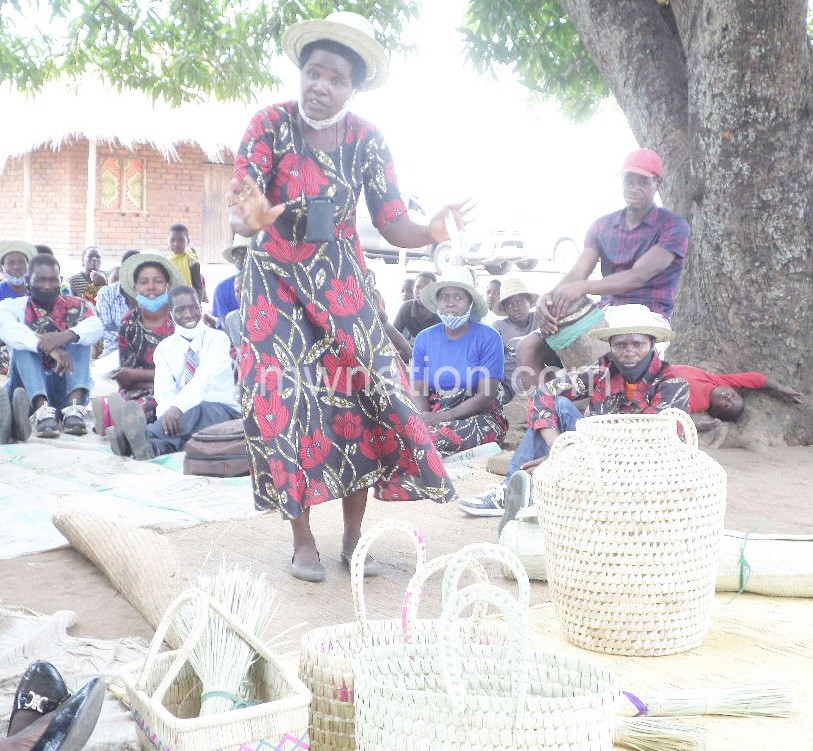‘Wicker baskets are cool’
Banned thin plastic carrier bags remain a common sight in busy markets across Malawi.
Every day, shoppers grab new plastic bags too thin to be reused.

As the cycle replicates itself daily, plastic waste keeps piling in open spaces, rivers and crop fields.
“After using the plastic, I just throw it away or burn it to light fire for cooking,” says Esther Kachimanga, from the populous Bangwe Township in Blantyre.
Either way, plastics harm human health and the planet.
When plastics end up in the environment and landfills, they do not decompose, but slowly break down into grains that contaminate soil, water and air.
“Burning plastics releases toxic gases like dioxins, furans, mercury and polychlorinated biphenyls into the atmosphere that threaten vegetation, and human and animal health,” cautions the United Nations Environment Programme.
Like Kachimanga, many Malawians seem unaware of the dangers plastic pollution poses.
Apart from sweeping streets every second Friday of the month, the National Clean-up Day launched by President Lazarus Chakwera last week demands a switch to sustainable alternatives to plastics.
In Tewete Village in Salima along Lake Malawi, some 30 women weave and sell traditional wicker baskets to kick out poverty and plastic pollution.
Biya Chisungwi, a member of the basket-making group, says “the return to basics” is not just celebrating culture.
“These baskets are cool. They can be reused for a year or two. When you discard them, they rot into manure. In the long run, they are less costly than thin plastic bags,” she explains.
Linda Samson says it is time shoppers reverted to wicker baskets as did Tanzania President John Magufuli to kick out plastic pollution.
“When the reusable baskets decompose, they make our barren fields more fertile,” she says.
Kavungutu Cluster took shape in 2016 with funding from IM Swedish Development Partner through Women’s Legal Resources Centre (Wolrec).
The women are weaving their way out of poverty selling the baskets, doormats, hats, washing baskets, brooms, beddings, trays, bags and toys from palm leaves.
They also buy hand-woven items for sale from unemployed young people in their community.
The group, which pools its savings and borrow at a low interest, also rears pigs to grow its income.
Besides, they sell clay pots, cloth wrappers, maize and fish.
The village savings and loan group offers them business capital.
Chisungwi, a single mother of six, says her life is improving.
“I obtained K40 000 loan and started selling fish, soap and salt. I have since built a three-bedroom brick house with corrugated iron sheets. I also bought 10 goats and two cows. I no longer struggle to meet my children’s needs,” she says.
Cluster chairperson Jennifer Thomson Shonga says everyone feels challenged to do business.
“The businesses are reducing gender inequalities and violence against women in the area. Married women are contributing to household income and single ones support themselves without resorting to risky sexual transactions,” she says.
The cluster members have resolved to upgrade from grass-thatched huts by 2021. Four have since made the shift and two houses are under construction.
Wolrec executive director Maggie Kathewere-Banda is excited that basket-making is enhancing women welfare, reducing gender-based violence, closing gender inequalities and tackling plastic pollution.
“We introduced the village bank concept and later engaged them into a basket-making cluster. I am happy the trade has empowered them economically,” she states.
Concurring, IM Swedish Development Partner country director Steve Tahuna urges Malawians to embrace green economies which depend on environmental sustainability.
The women encourage their households not to use plastics and other items that pollute the environment.
“We hope that our reusable baskets will help Malawians keep hands off plastics too,” says Shonga.





